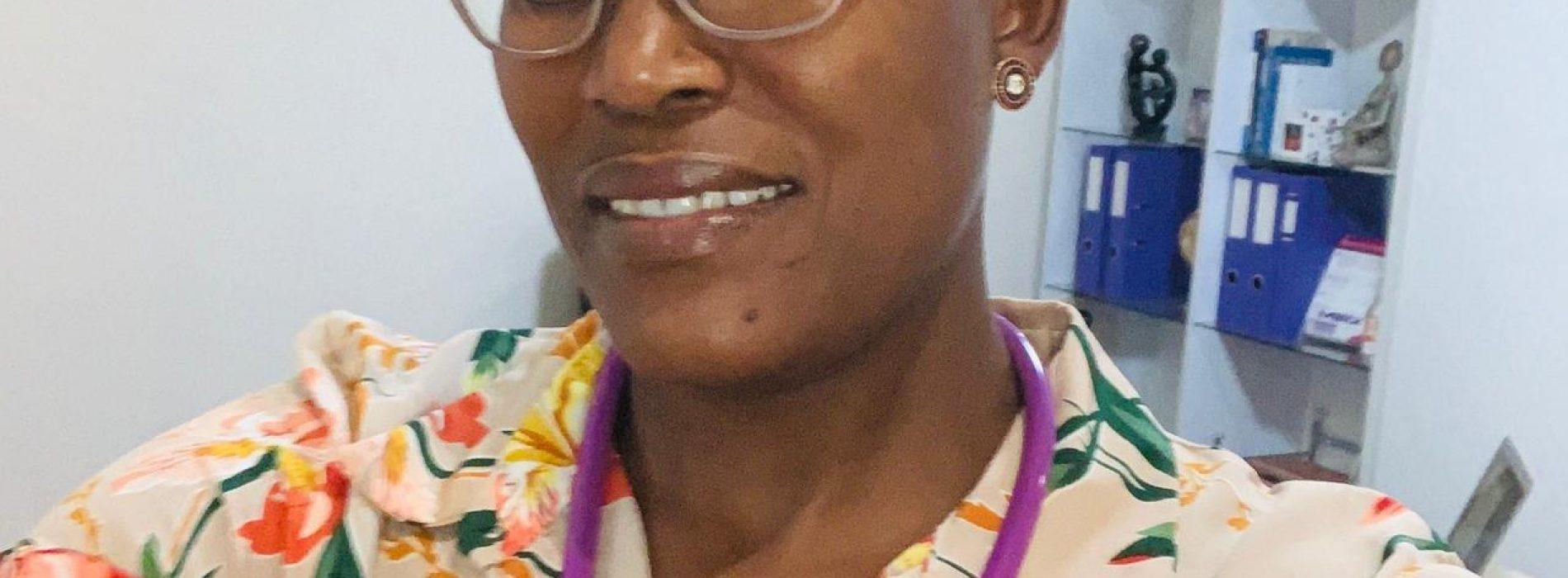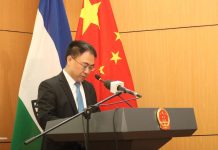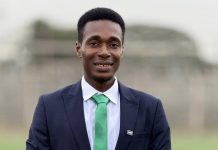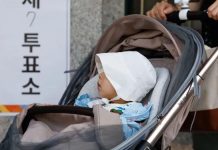Africa-Press – Lesotho. PASSIONATE about women’s health, Dr Lineo Mabusela-Letlala is on a mission to ensure that women and girls have the right information about their bodies.
“I want them to know how their bodies function, their sexuality, their reproduction, understanding all stages from puberty, womanhood to menopause and how to manage themselves,” Dr Mabusela-Letlala says.
“They should know who to consult when they have particular challenges with their bodies, what’s right and wrong, healthy and unhealthy.
It is a matter so close to the 41-year old specialist gynaecologist and obstetrician’s heart that she is now planning to start a women’s health movement as well as conduct symposiums to help women understand their medical conditions.
To achieve that dream, Dr Mabusela-Letlala set up a SHE health clinic in May 2019. The clinic is based in Arrival Centre and caters for women who are pregnant or have gynae-related issues.
“I am really happy to say that we are doing well and I am blessed to have employed six people.
It is a huge achievement as they can put bread on the table for their families,” said Dr Mabusela-Letlala, whose vision is to turn the clinic into a fully operational maternity home.
“Eventually we will have a proper world-class maternity home in Maseru,” she said, adding that she plans to extend SHE health to other districts.
“But the problem is the human resources aspect.
The plan will have to wait for a while as we figure out how to get a another gynaecologist,” said the international Top 1 award receiver at the University of the Free State.
It wasn’t her first academic achievement as she has previously bagged five other awards at different levels of her studies. “I really want to encourage young Basotho that they can actually become better.
She said her work experience has shown her that women are in dire need of information as they seek to become better people, please their partners, do what’s right with their bodies without engaging in harmful practices.
“I desire to see Basotho women fully knowing themselves.
”
Dr Mabusela-Letlala advised all women to visit a gynaecologist once a year for check-ups.
“They need to be examined to be sure that they are still okay because our reproductive organs are internal and it’s hard to see unless examined.
Many women seek medical help when its already late. The problems could have been detected and treated had they sought medical help sooner. ”
According to Dr Mabusela-Letlala, Lesotho has only three local gynaecologists and another four from other countries.
“We are in dire need of young people to become gynaecologists. We really need young people to go back to school and specialise so that we are not overwhelmed. ”
The second female Mosotho after the famous Dr Elizabeth Nonkosi Tlale to become a gynaecologist, Dr Mabusela-Letlala grew up in Ha-Matala, in a large family.
“Dr Tlale is playing a vital mentorship role to build me in my life and career,” she said. Dr Mabusela-Letlala comes from a Christian family where her father, Thabo Monyamane, was a pastor and an entrepreneur.
Her mother, ’Maneo Monyamane, was a teacher by training but chose to stay at home to raise her eight children. Dr Mabusela-Letlala described her parents as “hardworking, intelligent, focused and intentional parents.
”
“They did an amazing job raising us.
”
She also credits her husband for supporting her.
“He is a hardworking man who reminds me of my father. He is also ambitious and a go-getter,” she said.
Growing up, she did everything from house chores, working the family garden, tilling the field to servicing cars. “My dad didn’t give us any gender roles.
He would say there is no boy or girl. ” “There was no loitering on the streets. From school it was home, work and church. ”
“But I am very grateful for that background because it was either God or nothing else.
I was kept by grace. ”
She said she assumed leadership roles from a young age. She became part of the Girl Guides at school while still doing standard three.
“It moulded me as I used to lead as a Girl Guide leader entrusted to show other children the right way to go and cleaning the environment.
” She joined the Scripture Union and later became its chairperson when she moved to high school.
“I had ‘other parents’ there that I still consider my parents to date. They are Reverend Joseph Morenammele and Lineo Morenammele. They believed in me, made me and groomed me into a young leader.
“I finished high school aware of myself, knowing what I wanted and where I was going.
“This is because I was brought up into this leadership role that shaped and nurtured my character and my understanding of life such that I still maintained the leadership role in college.
”
She said she met another role model, ‘Mapefole Pefole whom she still considers her second mother. Pefole was an Aids coordinator in the ministry of Health.
The two had met when Dr Mabusela-Letlala was in form D and Pefole was working as a peer educator in different schools. “Pefole taught me life skills and understanding of HIV/Aids. I am always grateful as she played a big role as well. ”
After completing high school with flying colours, Dr Mabusela-Letlala took a gap- year and started a movement for peer educators called Lesotho Youth Anti-Aids Movement with some friends.
She said she worked in collaboration with the then AIDS Directorate. “We wanted to teach young people about HIV/Aids, life skills and decision making, alcohol and drug abuse.
Back then Aids was common amongst youths, hence the initiative,” she said. She added “it was the most fruitful year of my life. When I look back, I wouldn’t be where I am today without that experience.
” Dr Mabusela-Letlala said she had an opportunity to join the Media Institute of Lesotho (MISA), and attained a journalism certificate.
“We wanted to publish what we were doing with young people about life skills and HIV. We had a great time,” she said. Although she didn’t go further with the journalism certificate, she said it also played a crucial role in her life.
She said she always knew that she wanted to do medicine but because back then one could not be admitted into the course straight from high school, she had to do a detour first.
She did Medical Lab Sciences at the National Health Training College (NHTC). “We were fortunate that towards our final year the NHTC merged with the National University of Lesotho (NUL) and I graduated with a diploma.
”
She then applied at the University of Free State.
While waiting for admission, she became a Biology and Mathematics teacher at Hope High School for six months. “It was one of the detours that built me.
I learnt how to work with young people, lead them and encourage them to reach for the stars. ” “It was heart-breaking for me to leave them when it was my time to go to school. I even questioned whether I shouldn’t have been a teacher because I was very good at what I was doing.
”
After five years in medical school, Dr Mabusela-Letlala had a short stint at Baylor Pediatric College of Medicine Lesotho while waiting for Queen ’Mamohato Memorial Hospital to open.
“I was well aware that I wanted to work there, in maternity because of the influence I got at school.
”
She said at Baylor she was exposed to the magnitude of HIV&Aids in the country.
“It took me back to my gap year and I realised that after so many years down the line, it still remained an issue but now at a different scale.
People were no longer dying in their numbers but now they could live longer if they religiously took life-prolonging medication. ”
She said she then joined Tšepong where she worked in the maternity ward.
“My love for Obs (Obstetrics) and gynae (gynaecology) grew more when I realised that Lesotho didn’t have specialists; back then we had about three of them but they were stand-alone doctors doing quite well and then I realised that we needed a specialist in obstetrics and gynae.
”
“Maternity is a crucial area where one can lose a baby or mother and I noticed that I needed to go to improve myself.
”
She went back to the University of Free State for a five-year programme and did a fellowship in South Africa in Obstetrics and Gynaecology.
“It was one of the most difficult times of my life, testing time and I had to prove myself beyond doubt that I could become a specialist.
There was a time I felt like returning home but my parents as well as my husband backed me up. They were totally behind me. I had people who believed in me and made me believe that I was meant to do it.
” She said she later joined the Student Christian Organisation (SCO) similar to the Scripture Union and she was elected chairperson there as well.
“It helped me a lot at UFS where everyone was living their lives. Things were haphazard; there were no parents to guide me.
People I met there continued to be my parents, one of them was Jack Koma. ”
After graduation, she returned to Tšepong before SHE- health could be birthed. In her spare time, she is a part-time wedding planner and events manager. “It really makes me tick. I feel fulfilled after doing it.
”
“I have realised how a lot of couples suffer from infertility but are unable to access and receive services because of the funds and how expensive it can be to resource such services across the country. I want to start an In Vitro Fertilisation (IVF) clinic.
”
She is also planning to pursue a post-graduate diploma in law and ethics
“I realised that we still have a long way to go in terms of developing medical policies, ethical principles, creating a safe place for consumers where their rights and autonomies are respected and develop policies that govern medical practitioners in the country,’’
She further said she wants to establish a centre for rape survivors. The centre will be a safe place for assessment, collection of samples done so that perpetrators are attached to the actual crime, create space whereby they can get counselling, post-traumatic counselling that they are functional members of the society.
“I have realised that perpetrators go unpunished because there will be no evidence as it was never collected or attached to DNA samples. I want to create a space for proper assessment so that rape victims get the justice they deserve and the treatment they need after trauma.”
For More News And Analysis About Lesotho Follow Africa-Press






